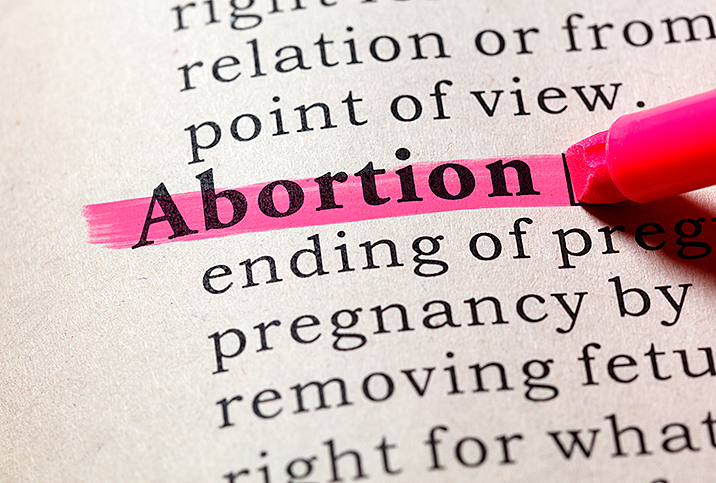Miscarriage and Medication Abortion Are Medically Indistinguishable

While we may be hearing more about abortion pills than ever before, self-managed medication abortions are not new.
Mifepristone (also known as RU486) was approved by the Food and Drug Administration (FDA) to safely end pregnancy more than 20 years ago, in 2000. Today, 54 percent of all abortions in the United States are done with medication, typically self-administered at home before 10 weeks of pregnancy using the FDA-approved regimen of mifepristone and a second medication, misoprostol.
These same medications are also commonly administered following a miscarriage to empty the uterus. The procedures, symptoms and treatments for both abortion and miscarriage overlap, and healthcare experts worry that current and forthcoming restrictions on abortion could also limit how physicians can safely manage miscarriage.
How the medications mife and miso work
Mifepristone is taken orally and works by blocking progesterone production. Misoprostol is placed buccally (between the cheek and gum), sublingually (under the tongue) or vaginally, and induces cramping and bleeding to expel tissue from the uterus. These drugs work the same way and produce similar symptoms afterward, whether the patient has decided to end their pregnancy or has had a miscarriage, which is called "spontaneous abortion" in medical literature.
Medication abortion is safe for most patients.
"Using the combination of mifepristone and misoprostol is a safe way to terminate a pregnancy, whether you obtain the pills in a clinic, doctor's office or a reputable source online," said Kate White, M.D., vice chair of academics at Boston Medical Center's OB-GYN department and author of "Your Sexual Health" and "Your Guide to Miscarriage and Pregnancy Loss."
"Medication abortion does take longer to complete than a procedural abortion, but the risks are low," White added.
The complication rate following a medication abortion is, in fact, very low, about 1 percent. Following either a miscarriage or medication abortion, patients can expect to experience the same two main symptoms: heavy bleeding and cramping.
What to remember if you seek medical attention
"We do know from studies that about 5 percent of patients will go to an ER [after a medication abortion], which means that a lot of people are going because they're scared but not because they really need to be there," said Sarah Horvath, M.D., M.S.H.P., an assistant professor of obstetrics and gynecology at Penn State Health Hershey Medical Center in Pennsylvania.
If a patient does seek medical attention following a miscarriage or self-managed abortion, the healthcare provider most likely will not be able to tell the difference.
"The symptoms of a miscarriage and a medication abortion look the same—both can have heavy bleeding and cramping—and the ultrasound images of the uterus look the same, as well," White said. "There is no blood test to detect the presence of the medications, though if there are pill fragments left behind in your mouth or vagina, those could be noticed."
In states with severe abortion restrictions, women could place themselves in legal jeopardy if they tell a healthcare provider they've had a medication abortion or the provider suspects it.
It's possible for undissolved tablets to remain in the vagina for several hours, stated Jen Gunter, M.D., a San Francisco-based OB-GYN and the best-selling author of "The Vagina Bible," on her website. "It seems advisable for people who live in areas with restrictive abortion laws and where abortion has been criminalized to not use a vaginal route for a self-managed misoprostol abortion," she writes.
In states with severe abortion restrictions, women could place themselves in legal jeopardy if they tell a healthcare provider they've had a medication abortion or the provider suspects it. In cases where a healthcare provider suspects a crime has been committed, sharing a patient's private health information with law enforcement without their consent may not be a violation of the privacy rule of the Health Insurance Portability and Accountability Act (HIPAA).
In April 2022 in Texas, Lizelle Herrera was arrested and charged with murder after hospital personnel reported her to law enforcement following an alleged self-managed abortion, though her indictment was promptly dismissed by the district attorney.
Your doctor has no medical need to know
Not only are providers usually unable to tell whether patients have had a medication abortion or a miscarriage, they also don't need to know to effectively treat them.
"Both the clinical presentation and the treatment are exactly the same," Horvath said. "My ability as a clinician to care for a patient matters not at all whether they're having a spontaneous miscarriage or if they took medications to induce an abortion. They are clinically indistinguishable. I don't need to know whether or not they took those medications to treat the patient appropriately."
Medication abortion is particularly helpful for women whose access to abortion services is limited by geography, income, language, immigration status, disability or other obstacles, said Katie Oliviero, Ph.D., associate professor of women's, gender and sexuality studies at Dickinson College in Carlisle, Pennsylvania, and author of "Vulnerability Politics."
"Medication abortion is an exceptionally useful healthcare tool, as it allows women to terminate their pregnancies in the privacy of their own home on a timeline that more easily works for them, which has the effect of reducing stigma and shame," Oliviero said. "When dispensed via telehealth and mail, it has the potential to mitigate many of the substantive barriers to abortion care."
But the most vulnerable pregnant people are also more likely to face increased scrutiny and potential legal peril.
"We know that abortion bans and restrictions are going to come down hardest on people of color and those in marginalized communities: LGBTQ, differently abled, non-English speaking and low income," White said. "The biggest threat of all with a self-managed abortion is not health-related, but criminalization."
Abortion is a medical procedure that is currently illegal or restricted in some portions of the United States. For more information about the legality of abortion in your area, please consult a local healthcare provider.


















